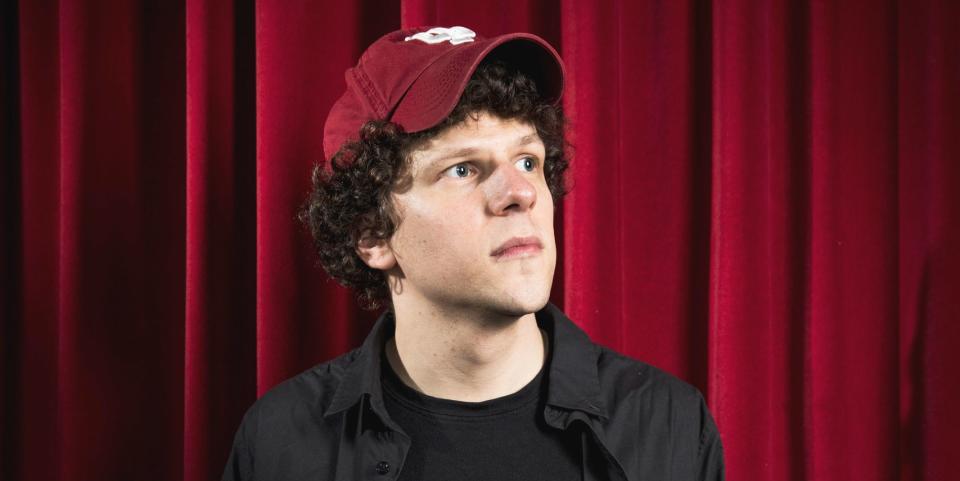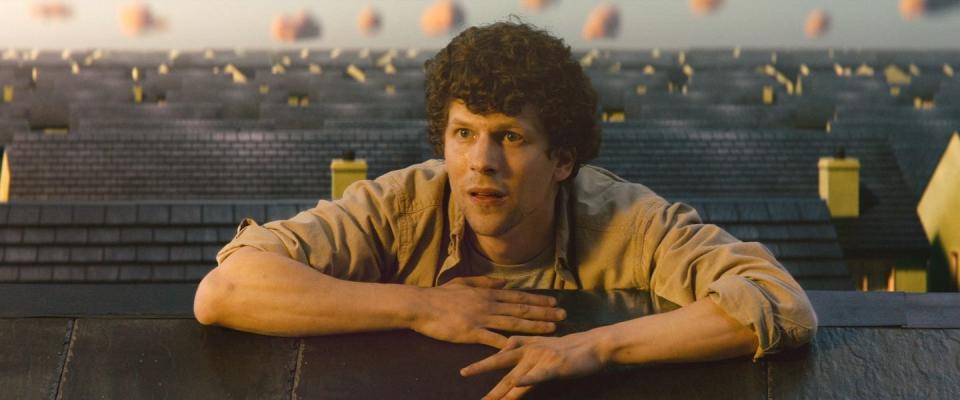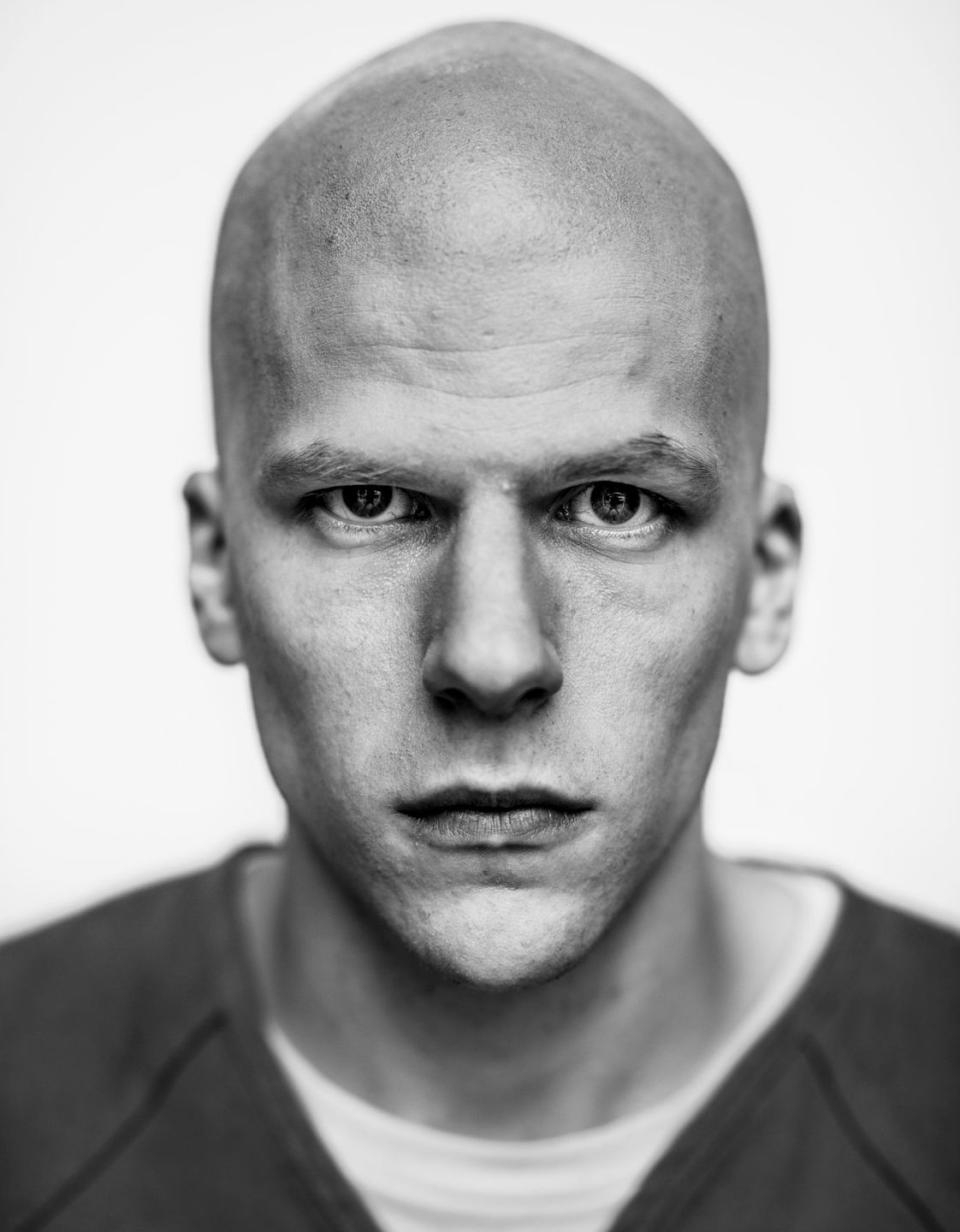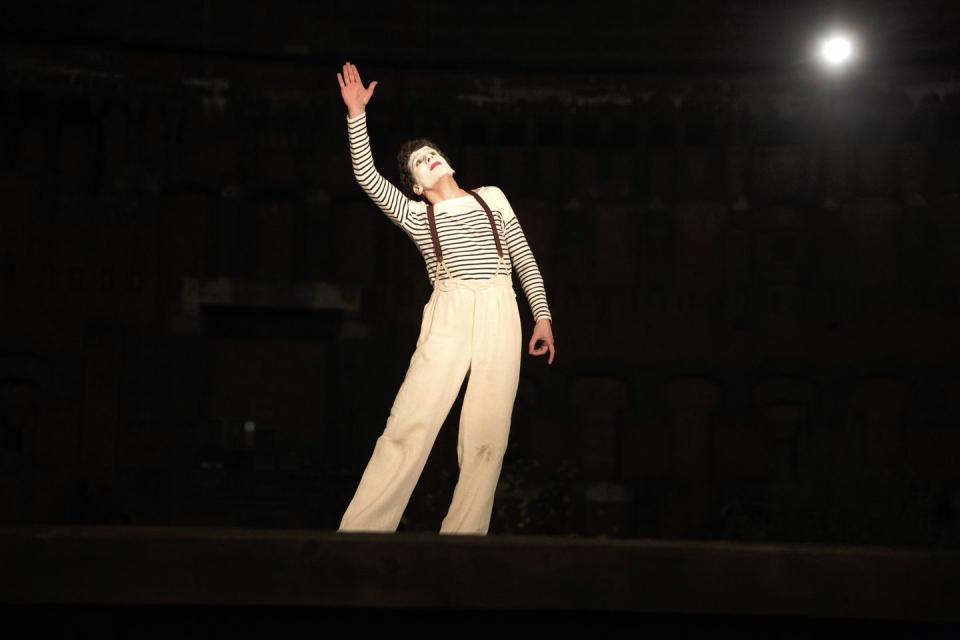Jesse Eisenberg on Snyder Cut fans, Jewish storytelling, and the one thing he looks for in a role

Jesse Eisenberg, in a red baseball cap and big, round glasses, is settling down against a tree, a swathe of green behind him on the tiny iPhone camera. "Sorry, I'm just in a park because I couldn't be in the house."
That his first words are an apology feel indicative of something. The second thing he does is ask how my family is doing, and ten minutes pass talking about one of many things in common: New York City's West Village.
It sets the tone for the conversation, in which he asks nearly as many questions as he answers. "Did you go to that restaurant across the street? That Italian restaurant. What was that place called? Malatesta? It's the best place in New York."
But Jesse isn't in New York and, even if he were, it's not like anyone's going to Malatesta right now. He's in Indiana with his wife Anna and their son.

"We rented an RV and drove here, so we were quarantined."
Jesse and his family came down to volunteer at a women's shelter previously run by his late mother-in-law. Coming to those in need is something that Jesse learned from his wife.
"She keeps telling me to, you know, shut up and humble myself, and use what it is that I do to help somebody other than myself."
Helping others is the tenet of the film which brought about this conversation. Jesse Eisenberg's new movie Résistance tells the true story of Marcel Marceau, the legendary mime artist, who was also a pivotal figure in the French resistance against Nazi invasion.
Though there is a difference between being a Jew now and then, for an actor who puts so much of himself into a role, one has to wonder what it's like when to inhabit a character with whom you have a fundamental thing in common.
It's a question that causes him to pause his distinct scatter-gun verbal style, before explaining: "When I started researching Marcel Marceau, I discovered that he and his family come from a very, very similar area to where my family comes from in South-Eastern Poland.
"He’s a guy who, as a young man, got into the arts and took himself very seriously, and then kind of became somebody who had to reconcile with helping others while doing his art. It’s the exact trajectory of my life."
Jesse explains: "My family comes from a similar part of Poland. I started as a young man doing my writing and acting and my little plays. And then I met my wife, she kind of pulled me into a life of trying to use my artistry to benefit other people.
"And of course, I entered like Marcel – reluctantly – and then discovered that it doesn’t compromise your work. So for me, the story was incredibly personal.
"And I lost family during the war, like Marceau obviously, and I’m sure like you too. I don’t know. What is your background, your Jewish background?" His question runs so fluid to his story, that there isn't time to plan a rebuff manoeuvre.
I tell him about my late father, who fought in the Pacific theatre in World War II (he became a parent much later). "Oh, how ironic," he says, that Jewish humour that some might misunderstand striking a loud chord.
Jesse talks about his son, who was one-and-a-half years old when Jesse took him to visit Dachau Concentration Camp: "I thought, he’s too young to be able to even sense that this is a place of terror.
"He slithered down from me as I was carrying him around where the barracks once were, and he was running around the overgrown area and he was laughing and giggling. And I had to chase him; the more I chased him, the more he was laughing.
"I was, like, initially horrified, because I thought we were disrespecting these hallowed grounds. But then I saw somebody kind of smiling and looking at my baby and smiling.
"It occurred to me that this was exactly the way that history needs to right itself, you know? That these horrors happened, and, of course, they’re still happening around the world for different groups of people.
"And the correction is not just to mourn, but the correction is to carry on, and for a place where my son’s ancestors – where they tried to exterminate my son’s ancestors – for him to be running around and laughing... It’s really a kind of form of, you know, history righting itself."
In Résistance, Marceau "comes to the conclusion that if the best way for them to resist is not just to pick one Nazi off at a time, dangerously on the streets of France, but actually to try to save as many kids as they possibly can."
"So he says the best way… you know, if you truly want to resist, the best way to resist is to survive. When I was watching my son run around overgrown barracks of Dachau, it just summed up that exact theme to me so perfectly – that the true way to win is just to survive.
"And yeah, so the movie spoke to me in so many wonderful ways, even more so than just being about Jews surviving the war, which my family did. It was more just about very — it spoke to me very specifically as somebody who is an artist, who’s constantly trying to reconcile the preciousness with which I treat my own artistry and helping others."

As timely as his words are, they're more prescient than anything; our conversation took place before George Floyd's death at the hands of police, which pushed the Black Lives Matter movement further to the forefront. The truth of racism and violence has existed for centuries.
That his words feel applicable now is an example of something else Jesse confronts in his work. "Vivarium was written as a reaction to the housing crisis in 2009 in Ireland," he explains. "And yet it’s coming out now, 11 years later, during a pandemic where everyone’s stuck at home.
"It just reminds me that movies are perceived not at the time that they’re written, but they’re going to always be filtered by the time the audience sees them – and you will not be able to avoid that, no matter how hard you try to make something that is speaking to the moment."
Zeitgeist-y as ever, there's no way to speak to Jesse and not ask about the Snyder Cut, about which he's "very happy" for Zack. But there is something troubling about an audience wielding such great power, especially when the motives of groups can often be rooted in bigotry.

He acquiesces it's a valid criticism, but is hesitant, it seems, to put a finer point on it. "Well, always, audiences have been dictating what people are making. But this is just kind of much more immediate, kind of pre-emptive."
Justice League and Batman V Superman, with all their muchness, are a far cry from his upcoming project in preproduction that he wrote and is directing. He describes the project as "pretty intimate", and it's hard not to think of the variety of roles Jesse has taken, from sprawling blockbusters to intimate indies, but the size of a film doesn't really matter to him. "I never know the scope and scale [of a movie] until we show up, and you realise that somebody’s been building a set for the last six months.
"As an actor, your job doesn’t really change. So you can’t ever take that kind of stuff into consideration because it doesn’t really have a big effect on you."
Which begs the question, what does he take into consideration?
"I just want to do a role that feels like it could exist outside of the movie.
"90% of— if you were an actor, you’d quickly realise that 90% of the roles you’re either auditioning for, or are asked to play if you’re lucky enough to, get sent movies, are just kind of characters that move the plot forward.
"And so even leading roles, a lot of time they’re kind of just pawns for a larger story. So I just look for roles that I can play that feel like they can exist outside the world of the movie.
"To me, that means my imagination will run wild, and I could, you know, have a kind of creative experience that transcends what the audience might see."
When there's a lack of these kinds of roles, Jesse writes them for himself. But in the case of Marcel Marceau, it's a role which certainly lives outside the story Résistance tells.
It's hard to imagine stepping away from such a transcendental experience, especially one which is so evocative of personal and ancestral trauma.
"As you know from being part of the same culture I’m from, I’m happy to indulge in sadness. I find that it’s a kind of enlightening experience, and so doing a movie like Résistance where every day you’re kind of immersed in the world of pain – you know, I can’t speak to other cultures as well as our culture, but we have never used that as an opportunity for self-destruction.
"We have only used that as an opportunity to grow, and to think, and to be creative, and to try to figure out ways for things like that to never happen again.

"And so after doing a movie like Résistance, it kind of opens me up to the sensitivity of, let’s say, kind of modern instances of anti-Semitism, but probably even more specifically to modern instances of people being treated in similar ways around the world who don’t have the same agency that I have."
As the conversation draws to a close, he asks after my mom and her work (by now he knows her profession, too). "I’d offer to bring her some food, but yeah, I’m not in New York," he says, and I actually believe that he would.
Résistance is out on Video on Demand June 19
For more information on how you can support Black Lives Matter, please visit its official website or donate here. Readers can also donate to the UK anti-discrimination group Stand Up To Racism, and the Unite Families & Friends Campaign, which supports those affected by deaths in police, prison and psychiatric custody.
Digital Spy now has a newsletter – sign up to get it sent straight to your inbox.
Looking for more TV recommendations and discussion? Head over to our Facebook Group to see new picks every day, and chat with other readers about what they're watching right now.
You Might Also Like

 Yahoo Movies
Yahoo Movies 